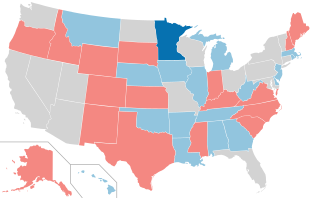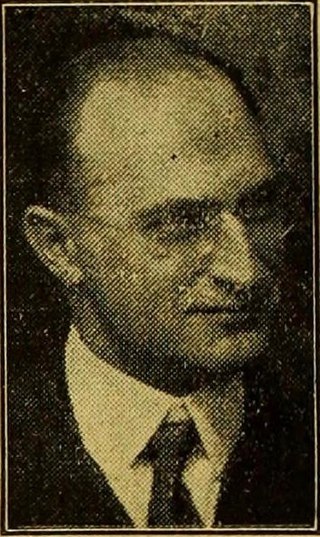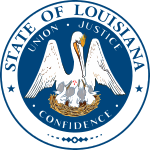
Huey Pierce Long Jr., nicknamed "The Kingfish", was an American politician who served as the 40th governor of Louisiana from 1928 to 1932 and as a United States senator from 1932 until his assassination in 1935. He was a left-wing populist member of the Democratic Party and rose to national prominence during the Great Depression for his vocal criticism of President Franklin D. Roosevelt and his New Deal, which Long deemed insufficiently radical. As the political leader of Louisiana, he commanded wide networks of supporters and often took forceful action. A controversial figure, Long is celebrated as a populist champion of the poor or, conversely, denounced as a fascist demagogue.

The 1996 United States Senate elections were held on November 5, 1996, with the 33 seats of Class 2 contested in regular elections. Special elections were also held to fill vacancies. They coincided with the presidential election of the same year, in which Democrat Bill Clinton was re-elected president.

The 1990 United States Senate elections were held on Tuesday, November 6, 1990, with the 33 seats of Class 2 contested in regular elections. Special elections were also held to fill vacancies. The Democratic Party increased its majority with a net gain of one seat from the Republican Party. The election cycle took place in the middle of President George H. W. Bush's term, and as with most other midterm elections, the party not holding the presidency gained seats in Congress. This was the first time since 1980 that any party successfully defended all their own seats, and the first time Democrats did so since 1958.

The 1972 United States Senate elections were held on November 7, with the 33 seats of Class 2 contested in regular elections. They coincided with the landslide re-election of Republican President Richard Nixon. Despite Nixon's landslide victory, Democrats increased their majority by two seats. The Democrats picked up open seats in Kentucky and South Dakota, and defeated four incumbent senators: Gordon Allott of Colorado, J. Caleb Boggs of Delaware, Jack Miller of Iowa, and Margaret Chase Smith of Maine. The Republicans picked up open seats in New Mexico, North Carolina, and Oklahoma, and defeated one incumbent, William B. Spong Jr. of Virginia.

The 1954 United States Senate elections was a midterm election in the first term of Dwight D. Eisenhower's presidency. The 32 Senate seats of Class 2 were contested in regular elections, and six special elections were held to fill vacancies. Eisenhower's Republican party lost a net of two seats to the Democratic opposition. This small change was just enough to give Democrats control of the chamber with the help of the Independent who at the start of this Congress in January 1955 agreed to caucus with them; he later officially joined the party in April 1955.

The 1932 United States Senate elections coincided with Democrat Franklin D. Roosevelt's landslide victory over incumbent Herbert Hoover in the presidential election. The 32 seats of Class 3 were contested in regular elections, and special elections were held to fill vacancies.

The 1930 United States Senate elections occurred in the middle of Republican President Herbert Hoover's term. The 32 seats of Class 2 were contested in regular elections, and special elections were held to fill vacancies. With the Great Depression beginning to take hold, Republican incumbents became unpopular, and Democrats picked up a net of eight seats, erasing the Republican gains from the previous election cycle, however, Republicans retained control of the chamber. This was the first of four consecutive Senate elections during the Depression in which Democrats made enormous gains, achieving a cumulative pick-up of 34 seats.

The 1912–13 United States Senate elections were held on various dates in various states. They were the last U.S. Senate elections before the ratification of the Seventeenth Amendment in 1913, establishing direct elections for all Senate seats. Senators had been primarily chosen by state legislatures. Senators were elected over a wide range of time throughout 1912 and 1913, and a seat may have been filled months late or remained vacant due to legislative deadlock. Some states elected their senators directly even before passage of Seventeenth Amendment. Oregon pioneered direct election and experimented with different measures over several years until it succeeded in 1907. Soon after, Nebraska followed suit and laid the foundation for other states to adopt measures reflecting the people's will. By 1912, as many as 29 states elected senators either as nominees of their party's primary or in conjunction with a general election.

Joseph Eugene Ransdell was an attorney and politician from Louisiana. Beginning in 1899, he was elected for seven consecutive terms as United States representative from Louisiana's 5th congressional district. He subsequently served for three terms in the United States Senate from Louisiana before being defeated in the 1930 Democratic primary for the seat by Governor Huey Long.

Thomas Semmes Walmsley was an American attorney and politician who was the mayor of New Orleans from July 1929 to June 1936. He is also known for his rivalry with Louisiana Governor Huey Long.

The 1928 Louisiana gubernatorial election was held on April 17, 1928. Like in most Southern states between the Reconstruction era and the civil rights movement, Louisiana's Republican Party was virtually nonexistent in terms of electoral support. This meant that the Democratic primary held on January 17 was essentially the real contest to decide the governor, as winning the Democratic nomination would be tantamount to election as governor.

The 1996 Louisiana United States Senate election was held on November 5, 1996, to select a new U.S. Senator from the state of Louisiana to replace the retiring John Bennett Johnston, Jr. of Shreveport. After the jungle primary election, state treasurer Mary Landrieu entered into a runoff election with State Representative Woody Jenkins of Baton Rouge, a former Democrat who had turned Republican two years earlier.

The 1932 United States Senate election in Arkansas took place on November 8, 1932. Incumbent Senator Hattie Caraway, who had been appointed to succeed her late husband Thaddeus Caraway in 1931 and won a special election to complete his term in January, ran for a full term in office.
William Franklin Spooner, known as Frank Spooner, is an oil and natural gas producer in Monroe in Ouachita Parish in northeastern Louisiana, who has been active since the early 1970s in his state's Republican Party. In the fall of 1976, Spooner waged a strong but losing race for the United States House of Representatives for Louisiana's 5th congressional district in a bid to succeed incumbent Otto Passman, who had been unseated in the Democratic primary by farmer/businessman Jerry Huckaby, then from Ringgold in Bienville Parish. Therefore, instead of facing Passman, as he had expected, Spooner competed with Huckaby for a relatively rare open seat in the state's congressional delegation.

The 1920 United States Senate election in Louisiana was held on November 2, 1920. Incumbent senator Edward J. Gay did not run for re-election.

The 1926 United States Senate election in Louisiana was held on November 2, 1926. Incumbent Democratic Senator Edwin Broussard was elected to a second term in office.

The 1936 United States Senate special election in Louisiana took place on April 21, 1936, to fill the remainder of the late former Senator Huey Long's six-year term. Long was first elected to the Senate in 1930 and was assassinated on September 10, 1935.

The 1968 United States Senate election in Louisiana was held on November 5, 1968. Incumbent Democratic Senator Russell Long was elected to a fifth term in office.

The 1974 United States Senate election in Louisiana was held on November 5, 1974. Incumbent Democratic Senator Russell Long was elected to a sixth term in office.
Lee Emmett Thomas was an American politician who served in the Louisiana House of Representatives and its Speaker as a member of the Democratic party. He also served as the Mayor of Shreveport from 1922 to 1930 and ran unsuccessfully for US Senator for Louisiana against Joseph E. Ransdell in 1924.



















